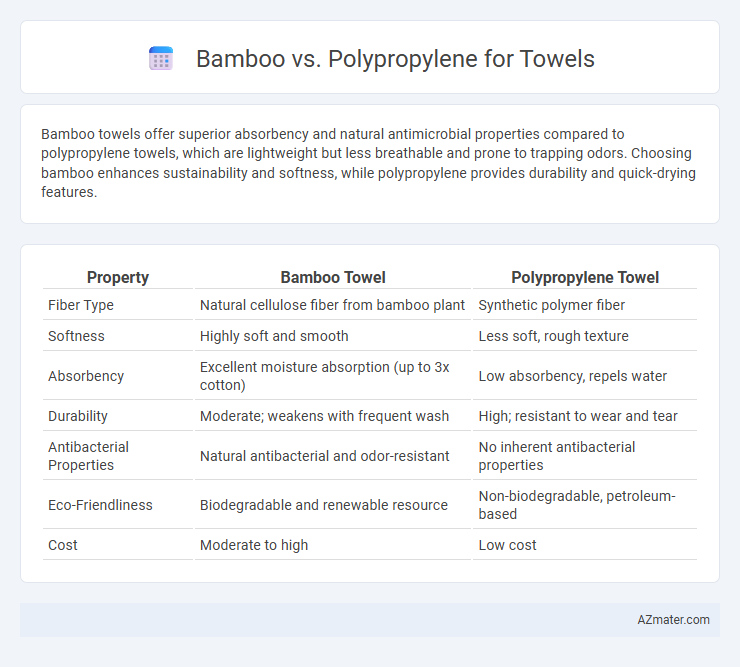Bamboo towels offer superior absorbency and natural antimicrobial properties compared to polypropylene towels, which are lightweight but less breathable and prone to trapping odors. Choosing bamboo enhances sustainability and softness, while polypropylene provides durability and quick-drying features.
Table of Comparison
| Property | Bamboo Towel | Polypropylene Towel |
|---|---|---|
| Fiber Type | Natural cellulose fiber from bamboo plant | Synthetic polymer fiber |
| Softness | Highly soft and smooth | Less soft, rough texture |
| Absorbency | Excellent moisture absorption (up to 3x cotton) | Low absorbency, repels water |
| Durability | Moderate; weakens with frequent wash | High; resistant to wear and tear |
| Antibacterial Properties | Natural antibacterial and odor-resistant | No inherent antibacterial properties |
| Eco-Friendliness | Biodegradable and renewable resource | Non-biodegradable, petroleum-based |
| Cost | Moderate to high | Low cost |
Introduction to Bamboo and Polypropylene Towels
Bamboo towels are crafted from natural bamboo fibers, offering exceptional softness, breathability, and antimicrobial properties that make them highly absorbent and eco-friendly. In contrast, polypropylene towels are made from synthetic polymer fibers known for their durability, quick-drying ability, and resistance to mildew, making them ideal for outdoor and heavy-use scenarios. Both materials present distinct advantages in towel manufacturing, with bamboo emphasizing sustainability and comfort, while polypropylene focuses on practicality and resilience.
Material Origins and Sustainability
Bamboo towels are made from natural bamboo fibers derived from fast-growing bamboo plants, which are renewable and require minimal water and pesticides, making them a highly sustainable option. Polypropylene towels are produced from synthetic polymers derived from petroleum, a non-renewable fossil fuel, contributing to environmental concerns such as pollution and carbon emissions. The biodegradability of bamboo contrasts with the non-biodegradable nature of polypropylene, emphasizing bamboo's eco-friendly advantage in sustainable towel materials.
Environmental Impact Comparison
Bamboo towels offer significant environmental advantages due to bamboo's rapid growth rate and minimal need for pesticides, making it a highly renewable resource compared to polypropylene, a petroleum-based synthetic fiber with a larger carbon footprint. Bamboo fibers are biodegradable and compostable, reducing landfill waste, whereas polypropylene towels contribute to microplastic pollution and persist in the environment for hundreds of years. Choosing bamboo towels supports sustainable forestry practices and lower water consumption, while polypropylene manufacturing relies on non-renewable fossil fuels and energy-intensive production methods.
Absorbency and Drying Efficiency
Bamboo towels exhibit superior absorbency due to their natural micro-gaps and antibacterial properties, allowing them to wick moisture effectively and retain more water compared to polypropylene towels. Polypropylene towels, while less absorbent, dry much faster because of their synthetic, non-porous fibers that repel water and reduce drying time significantly. Choosing bamboo towels enhances moisture absorption and comfort, whereas polypropylene offers quick-drying efficiency ideal for rapid reuse.
Softness and Comfort for Sensitive Skin
Bamboo towels are highly regarded for their exceptional softness and natural hypoallergenic properties, making them ideal for sensitive skin by minimizing irritation and promoting comfort. Polypropylene towels, while durable and quick-drying, often lack the gentle texture necessary for delicate skin and can cause discomfort or irritation with prolonged use. Choosing bamboo towels ensures superior softness and breathable comfort, enhancing the experience for individuals with sensitive or allergy-prone skin.
Durability and Longevity
Bamboo towels exhibit exceptional durability due to their natural strength and antimicrobial properties, which resist wear and bacteria, prolonging fabric lifespan. Polypropylene towels offer high resistance to moisture and chemicals, making them durable in harsh environments but prone to pilling over time. Between the two, bamboo towels generally provide longer-lasting softness and resilience, while polypropylene excels in durability under industrial or heavy-use conditions.
Maintenance and Care Tips
Bamboo towels require gentle care, ideally washed in cold water with mild detergent to preserve fibers and prevent shrinkage, while polypropylene towels benefit from quick-drying, low-heat washes to maintain their moisture-wicking properties and avoid fabric damage. Avoid fabric softeners for both materials as they can reduce absorbency and affect towel performance. Proper drying--air drying bamboo towels and using low heat for polypropylene--is essential to extend towel lifespan and keep fibers intact.
Allergen and Odor Resistance
Bamboo towels naturally resist allergens and inhibit bacterial growth due to their antimicrobial properties, reducing odor buildup and improving hygiene. Polypropylene towels are moisture-wicking and dry quickly, which limits bacterial proliferation but may retain synthetic odors over time. Choosing bamboo towels offers superior allergen resistance and odor control, making them ideal for sensitive skin and prolonged freshness.
Cost and Value Analysis
Bamboo towels generally cost more than polypropylene towels due to sustainable cultivation and eco-friendly processing methods, offering better long-term value through superior softness, absorbency, and natural antimicrobial properties. Polypropylene towels are inexpensive and quick-drying but often lack durability and comfort, making them less cost-effective in frequent use scenarios. Choosing bamboo towels supports environmental sustainability and enhances user experience, justifying the higher initial investment with greater lifecycle value.
Final Verdict: Which Towel is Right for You?
Bamboo towels offer exceptional softness, natural antibacterial properties, and eco-friendly sustainability, making them ideal for sensitive skin and environmentally conscious consumers. Polypropylene towels excel in durability, quick-drying capabilities, and affordability, suited for active lifestyles and outdoor use. Choosing between bamboo and polypropylene towels depends on prioritizing softness and sustainability versus durability and moisture-wicking performance.

Infographic: Bamboo vs Polypropylene for Towel
 azmater.com
azmater.com